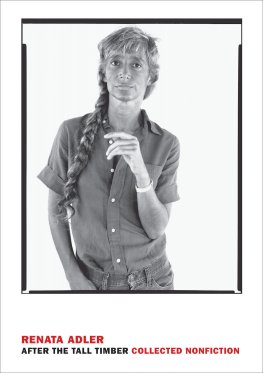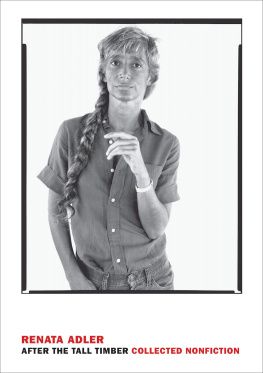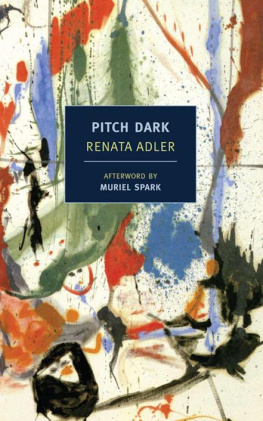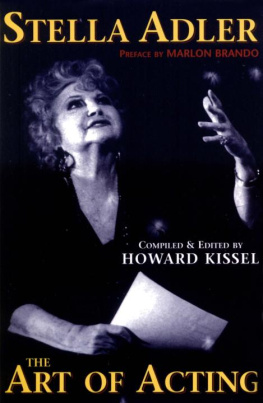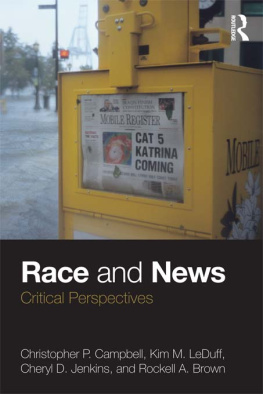Renata Adler
After the Tall Timber
RENATA ADLER has become something of a cult figure for a new generation of literary-minded young women since the 2013 re-release of her novels, Speedboat (1976) and Pitch Dark (1983). Those books represent an early point, and in many ways a high point, in the portrayal of a modern sort of angst vulnerable women adrift in both the psychological and actual world. Adler herself can often seem like an iconic figure of fragility and lostness with her long bouts of literary absence and silence.
Here, however, in this collection of her most significant journalism, she is a diametrically opposite figure: a fierce and aggressive writer, known and feared and sometimes shunned for turning her stone-cold and contrarian judgments on her own professional class. I do not think it is an exaggeration to say that her writing is some of the most brutal ever directed at journalism itself.
Shortly before the publication of Gone, her broadside against The New Yorker and what the magazine became after it was sold in 1985 by its original owners, I was at a cocktail party on Manhattans West Side at the home of a New York Times cultural supremo attended by a set of publishing myrmidons of frightening standing and lockstep opinions. Following the whispered name Renata, I literally intruded on a clucking circle of these reproachful men planning their counterattacks against her: something must be done.
The writer Harold Brodkey, her friend and colleague at The New Yorker, once said to me, in the 1970s when she was having her famous and glamorous moment, that in his view, Renata could not decide whether to live an interior writers life or an exterior activists life. At the time, I thought his comment was about her work in Washington in 1974 with the House Judiciary Committees impeachment inquiry staff, where she had become a sort of historys ghostwriter recruited to make inarticulate politicians sound like men worthy of impeaching a president and then her decision, at the peak of her fame, to enroll at Yale Law School. Should she seek real worldly power or continue as a mere writer on the sidelines? (It is quite extraordinary to consider that real power might have been within her grasp.)
In fact, I think I misunderstood what Brodkey was saying. What she was wrestling with was not career suitability, but her divided nature: on the one hand, muddled fear and vulnerability, and on the other, clearheaded outrage and scorn.
These feelings are not, of course, mutually exclusive.
A persons vulnerability and fears do not mean that he or she cannot also summon a particular courage. Perhaps such fear compels a person to redouble his or her efforts and boldness. Adler, who, among her friends, is well known for not being able to navigate a few blocks or keep her possessions about her, nevertheless, during a particular period of twentieth-century turmoil showed up for the civil rights movement in Selma, Alabama, the genocidal conflict between Nigeria and Biafra, and the American descent into Vietnam.
It is this contradictory nature, I believe, that has made her such a conundrum: she seems so appealing and uncertain (ever in need of protection) and then changes her clothes and goes to war. Not to mention the fact that she has often gone to war with her own colleagues, making her not just a confusing figure but an anathema as well.
At some point, perhaps quite unaware, she crossed over from a career as a cosseted insider to a what-ever-are-we-going-to-do-with-her outsider.
She was born in Milan in 1938 to parents fleeing Nazi Germany. She grew up in Connecticut and went to Bryn Mawr, then to graduate school at Harvard and the Sorbonne. In 1963 she joined The New Yorker as a staff writer.
For the next twenty years or so, she was a leading light in a particular brilliant period of American writing. She was an it girl, complete with the iconic look and memorable pictures by Richard Avedon, provocative and fashionable. (I recall my parents, culture vultures in suburban New Jersey, discussing her with great awe.) The New Yorker then was the equivalent of something similar to HBO now you wouldnt have missed it, or her.
In 1968, she became the New York Times film critic (the first woman in the job when being the first women was a miraculous transformation) at a moment when writing about film was, arguably, more influential than making films and when The New York Times was the first and last critical word. In the early 1970s, she went to Washington where she became the Watergate committees writer at the epicenter of the most momentous public event of the era. Then came Speedboat, followed by Yale Law School, then Pitch Dark; then came her book Reckless Disregard, about the big twin libel lawsuits of the early 1980s, Westmoreland suing CBS, Sharon suing Time; and then, practically speaking, nothing.
Writers careers, even ones that have reached a great height, are fragile things, and they can go wrong for many reasons and as the result of many choices: money, drugs, Hollywood, among others.
But Adlers career goes wrong, or at least astray, or far from the light, primarily for not being able to keep her silence. Adler is a good demonstration of the boundaries of art, that even serious writing is harshly proscribed, that the literary life has hard rules, that politics must be carefully played, that renegades and, no doubt, especially women renegades who go past an undrawn line are cast out.
She surely managed to cross many of the mightiest and most thin-skinned cultural institutions and arbiters. She offended The New York Times: first, writing excessively scathing film reviews for the paper; and then, a worse sin, quitting the Times after a year and returning to The New Yorker. Even now, with the Times having lost considerable power and clout, it is difficult to pursue a serious career in letters with its institutional disapproval shadowing you. And it has, literally for decades, pursued an odd, sour, spurned lovers vendetta against Adler (compounded and renewed by Adlers reflexive counterattacks on the paper), which she dissects in the introduction to Canaries in the Mineshaft: Essays on Politics and Media (2001), included here.
There is, of course, her famous or infamous review of Pauline Kaels book When the Lights Go Down. Its hard to remember what a cultural despot Kael, then the New Yorkers film critic, was when Adler wrote her review in 1980. Kael was bully, drama queen, suck-up, disciplinarian, hysteric, and taking jobs and inducements from the people she promoted a bit corrupt, too. Still, opprobrium yet attaches to Adler for her sweeping emperors-new-clothes leveling of Kael; and it certainly earned her no points with The New Yorker, their mutual employer. But the rightness of Adlers view of Kael as nasty, self-promoting gasbag only become more obvious as Kaels reputation disappeared after she lost her New Yorker post and power. She was unreadable, said Adler; and indeed, Kael is unread now.
Adlers cheerfully absurd recollections of the editing process at The New York Times, which serves as an introduction to the collection of movie reviews she wrote during her year, at the age of thirty, as the Timess chief film critic, is perhaps the best exegesis of the leveling and zero-sum game that editors so often play, and another thwack on the Timess nose.
Then, there is her Watergate view. She is one of the few perhaps, the only more-or-less liberal party to the proceedings to argue, against the orthodoxy of pretty much the entirety of liberal media, that, all in all, it was a fairly weak case against Richard Nixon (and that the real reasons for his resignation were hidden from view).

